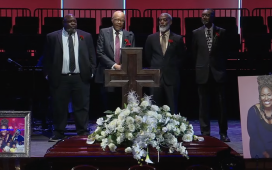The Australian Human Rights Commission asks itself one question when evaluating government bills: is this an acceptable way to apply international human rights law?
When it comes to the government’s contentious religious discrimination bill “The answer is no,” says Ed Santow, the human rights commissioner. “It was ‘no’ in relation to the first draft as well.”
The second round of consultation on the religious freedom bills closed on Friday. The process has won the attorney general, Christian Porter, a few more friends, particularly among conservative religious groups.
But for many such as the AHRC problems remain. And for others, including the LGBTI rights group Equality Australia and the Australian Medical Association, the second bill is categorically worse.
In its submission, the AHRC praised the bill’s core aspect – to prohibit discrimination on the grounds of religion – while warning that other provisions “provide protection to religious belief or activity at the expense of other rights”.
It called for wholesale changes of provisions which limit other human rights in a way that is “unnecessary and disproportionate or otherwise inconsistent with international law”.
The second draft made a raft of changes, the most significant of which was to allow religious hospitals, aged-care facilities and accommodation providers such as retirement homes the ability to discriminate against staff on the basis of religion to preserve their “religious ethos”.
This appeased the Sydney Anglican diocese which had warned the first version was so flawed it could not be supported.
Bishop Michael Stead says the new measures are “a sensible balance between the right of freedom of religion with other rights”. In its submission, the Freedom for Faith lobby group agreed the new bill is “much better”.
But the AMA warned the changes would “[undermine] the rights of some doctors by enabling employers to discriminate against them based on religious belief”.
Santow says the AHRC agrees that religious bodies should be able to preference adherents of their religion where it is an “inherent requirement of the job”, such as a minister of religion.
“But where they are providing a service to the public with government funding the default position should be that [service provision and staffing is] done in a non-discriminatory way.
“In our view the bill as it currently stands is unacceptable. It does not protect human rights in a way that protects the entire community equally – that is the lodestar of any human rights reform.”
‘Not every group’ will be happy: Porter
Porter rejects that charge, arguing the legislation seeks to strike a balance “in a clear, prescribed way” although he concedes that “not every group is going to be perfectly in agreement or happy” with the ultimate draft.
He argues aged care and hospitals “in effect” already have the ability to prefer people of their religion in employment: “So I’m not seeing how support to that existing ability to religious hospitals in any way negatively affects doctors and medical professionals.”
Stead agrees, saying critics “mistakenly claim” the bill will increase discrimination when “something that is currently unlawful discrimination” – such as refusal to provide services or hire someone based on sexuality – “will remain unlawful discrimination”.
But the AHRC believes the exemptions – which also extend to religious charities – are too broad, and undermine the rationale for the bill, with the result that Santow argues it “protects the right to religion for some at the expense of religious equality of others”.
Ghassan Kassisieh, the legal director of Equality Australia, agrees, arguing the exemptions are so broad that religious organisations will have a “blanket exemption” to discriminate on beliefs in aged care, hospitals and service delivery by charities.
While discrimination on sexuality and gender would still be banned, the exemptions create “enormous gaps” such as where a gay student comes out to a teacher, the teacher could be fired for telling the student “that’s OK”, he says.
The other major sticking point is the exemption for statements of religion from federal, state and territory anti-discrimination law, which Santow says are “unique” among liberal democracies.
Kassisieh argues the second draft bill makes the problem much worse because the government has raised the threshold for complaints so that only statements which “seriously intimidate” others are banned.
That waters down existing protections “when degrading or humiliating things are said in the workplace, or in schools or during the provision of services”, he says.
Porter says the provisions ensure someone “can’t be the subject of a discrimination act complaint for the mere statement of religious belief”.
Similarly employers cannot set codes of conduct that constrain employees from making “non-malicious non-vilifying statements of religious belief in their spare time”.
“People of religion would, I think, rightly consider saying what they believe is a necessary part of their religiosity.”
Doctors can just ‘walk away’, AMA warns
Porter says the government did not listen only to conservative religious groups, but took on board LGBTI groups’ concerns that doctors could use conscientious objection provisions to discriminate against them.
The conscientious objection provisions “are meant to protect existing abilities of doctors and medical professionals to conscientiously object – and they do no more than that”.
But Dr Chris Moy, chair of the AMA’s ethics and medico-legal committee, disagrees.
He says the existing professional framework allows doctors to conscientiously object if they have deeply held beliefs, but not to “walk away” from patients, by requiring them to treat patients in an emergency or at least to provide them with a referral.
“Our concern is in this new legislation – they’ve got this very new definition … The bar is significant harm to the patient.”
Although cases of refusing to provide contraception and sexual health services may not be illegal under the status quo, Moy thinks doctors will be emboldened to say “I don’t feel like doing this” and trust with patients will be undermined.
Fiona Patten MP
(@FionaPattenMLC)Thoughts? Doctor refuses to provide contraception and other sexual health services pic.twitter.com/ahy5fAHQhj
“If I have an objection at the moment, at least I have an obligation to assist you to get the care,” Moy says. “This [bill] allows you to just walk away. That’s not where we want to be as a community.”
We will not be ‘obstinate’ in face of amendment: Porter
With the continued opposition of many peak medical and legal bodies, LGBTI, women’s and human rights groups the bill faces a difficult path when it is introduced to parliament.
The opposition leader, Anthony Albanese, told the Labor caucus in November that “we support freedom of religion but we don’t support increasing discrimination in other areas”.
Before the second draft was release, Labor’s health spokesman, Chris Bowen, described the bill as “friendless”, both strong signs the opposition is unlikely to support it.
Asked about the prospect of bipartisanship, Porter warns against “[presuming] a complete unanimity of views within the Labor party [on the bill]”.
“My observation is there is quite a wide variety of views inside the Labor party,” he says.
Porter says he had met Albanese and he seemed “genuine in his intention to deal with the legislation on its merits” and “this wasn’t going to be a politically point-scoring exercise”.
Porter suggests there might be “very minor” changes before the bill is introduced to parliament and he “can’t predict” what changes parliament might make.
“The purpose is to have passage of the bill so we’re not going to be obstinate about suggested changes,” he says.
“But of course suggested changes can’t detract form the central purpose of the bill: to protect Australians of religion from real world circumstances … which detract from their ability to be free from discrimination based on their religion.”
For the AHRC the solution is simple: there is no need to reinvent the wheel. Santow says the government could simply “remove or amend the provisions we see as problematic, and the core of the bill would be a conventional religious discrimination bill”.






